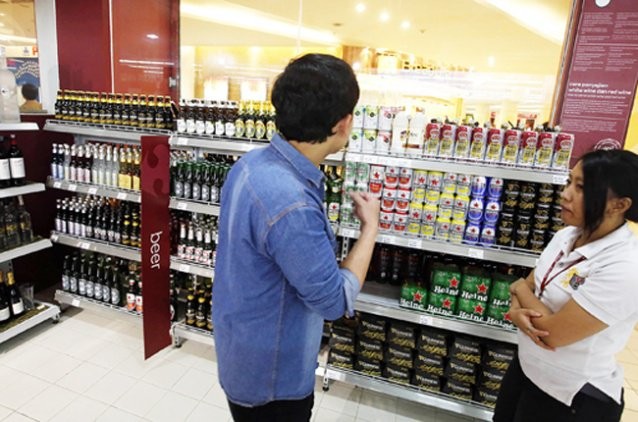Popular Reads
Top Results
Can't find what you're looking for?
View all search resultsPopular Reads
Top Results
Can't find what you're looking for?
View all search resultsGovernment takes harder stance on liquor
Change text size
Gift Premium Articles
to Anyone
H
ome Minister Tjahjo Kumolo has strengthened his stance against the consumption of liquor by stating it is important for all regions to have bylaws banning the distribution of alcoholic drinks across their territories.
Tjahjo’s intention to impose a total ban on the consumption of liquor goes beyond the bylaws, which mostly restrict its production, distribution and consumption.
Some bylaws in the regions only limit the distribution of alcoholic drinks because of the increasing number of criminal cases driven by the misuse of alcohol.
Through the bylaws, several regions now only allow the sale of alcohol in particular places like hotels or bars. No shops have been allowed to sell liquor since the issuance of such regulations.
Not all regions imposed bans on alcohol for various reasons, but Tjahjo said he supported the decision by Papuan Governor Lukas Enembe to issue and consistently implement a bylaw banning the distribution of alcohol in his province.
“This is also to clarify an ongoing news report that the ministry would revoke bylaws banning and controlling the sale and the distribution of alcohol in regions. The ministry thinks that it is important to have bylaws banning alcohol,” Tjahjo said on Sunday.
Tjahjo said currently a number of bylaws across the country overlapped each other and the ministry had instructed regional administrations to synchronize any conflicting regulations on alcohol distribution.
“Principally, such bylaws must be consistently and proportionally implemented throughout the country especially because alcohol can trigger crimes too,” he added.
Several regions on Sunday strongly reacted after they heard that Tjahjo had instructed local administrations to revoke bylaws limiting the distribution of alcohol.
Debate on whether to restrict the distribution of alcoholic drinks has received public attention because the House of Representatives is now deliberating a bill to regulate alcoholic drinks.
A politician from the United Development Party (PPP), Arwani Thomafi, criticized Minister Tjahjo before he issued a clarification.
“A regulation can be revoked if it is against a higher law or against the public interest. On the contrary, a bylaw that restricts the distribution of alcohol is meant to uphold the interests of the public,” said Arwani.
“The bylaw is to prevent crimes that come from consumption of alcoholic drinks, such as rape and other types of crimes that disturb public peace,” he said, adding that the government must not arbitrarily revoke any bylaws that regulate the distribution of alcohol.
Makassar city, which has seen a rise of criminal cases allegedly driven by alcohol consumption, insisted that alcoholic beverages in the city should be restricted by keeping the existing bylaw.
“We are upholding the bylaw firmly and continuously because alcohol is one of the main reasons that give birth to crimes in society,” said Makassar Mayor Mohammad Ramdhan Pomanto, adding that in the city alcohol can only legally be sold at hotels, pubs, bars and karaoke parlors.
As part of a stricter control, the city prohibits people from bringing home alcoholic drinks they bought from those designated places. The city also set up a special team to monitor the distribution of alcohol in the nearby shops.
A number of regencies in South Sulawesi have followed the move taken by the city, including Maros, Bulukumba and Enrekang.
Meanwhile, the city of Pontianak, in West Kalimantan, took a stricter measure than Makassar by limiting the sale of alcoholic beverages to three- and four-star hotels only.
Instead of banning the distribution of alcohol, the city is also considering imposing a stricter control on alcohol in order to protect the younger generation from the negative effects of alcohol in the city.
In addition, Yogyakarta, which earlier saw 39 people, mostly students, die after drinking bootleg alcohol in February, would also keep its prevailing bylaw on alcohol.
Meanwhile in Batam, the local administration said that it was important not to ban the use of alcohol in the region because tax from alcohol sales contributes greatly to the region’s income.










